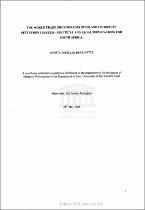The world trade organisation (WTO) and its dispute settlement system - political and legal implications for South Africa.
Abstract
ln this mini thesis, I explore the new WTO Dispute Settlement System in relation to developing countries' and South Africa's access to this system. I argue that this new system, as a rule based system allows for greater access for developing countries and South Africa, however there are a number of problems associated. I explore the change from GATT to the WTO and how these changes have facilitated the access of developing countries. During this process I analyse the positive and negative aspects of the system in relation to developing countries. I critically investigate developing countries access to the Dispute System, and in particular South Africa's access to the system. In this section I base my investigations on the view of Alban Freneau in his LLM paper, WO Dispute Settlement System and Implementation of Decisions: a Developing Country perspective and BM Hoekman and PC Mavroidis paper called Enforcing Multilateral Commitments: Dispute Settlement and Developing Countries. In this section I deal with issues of retaliation, compensation, implementation of panel rulings, financial problems and transparency. Furthermore, I look at what the Department of Trade and Industry have achieved with regard to access to the dispute system. Lastly I address new negotiations that are occurring within the WTO in relation to the Dispute Settlement Understanding and how this could affect developing countries and in particular South Africa. Lastly the mini thesis is concluded with recommendations for developing countries and South Africa if they are to access the system. I suggest that developing countries should lobby to start an investigation to whether developing countries could have shorter periods of time to process their cases as well as gaining increased financial support. I finally
support Hoekman in his statement that it is important to educate commercial business and government institutions in WTO laws and regulations, as this will lesson the need for cases to be filed at the WTO as well as create less of a burden on the developing country.

